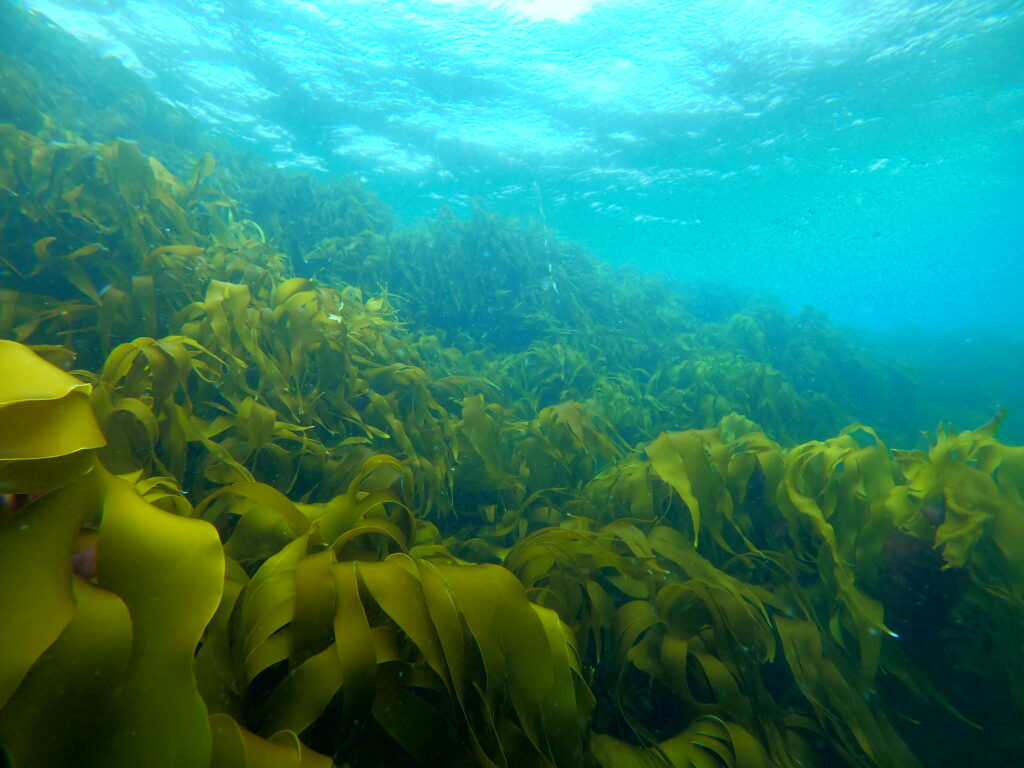
A groundbreaking study by an international team of researchers has revealed seaweed forests to be significant contributors to oceanic carbon storage.
Their research estimates that the world’s seaweed forests transport 56 million tonnes of carbon (between 10 to 170 million tonnes) to deep ocean sinks each year. Between 4 and 44 million tonnes of this carbon could remain sequestered in these deep sinks for at least a hundred years.
This discovery, published in the prestigious journal Nature Geoscience highlights a considerable contribution of macroalgae to oceanic carbon sinks. The study also suggests that large-scale shifts in seaweed forest distribution and abundance, including past and ongoing losses, would affect the carbon sink capacity. In doing so, the study provides further impetus for efforts to increase seaweed forests through conservation or restoration.
Seaweed forests, primarily composed of large brown macroalgae like kelps and rockweeds, are among the most extensive and productive vegetated coastal ecosystem on the planet and are hotspots of marine biodiversity. These ocean forests can grow as rapidly as forests on land and are efficient in capturing carbon, which they store in their biomass. Part of this biomass can be transported to deep ocean sinks.
The study, spearheaded by Dr Karen Filbee-Dexter at the Norwegian Institute of Marine Research and the University of Western Australia, reveals that seaweed forests export about 15% of their captured carbon into deep ocean waters each year, where part of it can remain trapped for centuries. The study estimates that seaweed-carbon exported below 200 m depth totaled 3–4% of the global ocean carbon sink. The findings thereby underscore the need to include macroalgae in the depictions of the ocean carbon budget, which mostly ignores the contribution of marine vegetation.
The international team used state-of-the-art global ocean models to track the fate of seaweed carbon from the coast to the deep ocean. The transport time for macroalgae to the deep ocean was compared to their degradation rate to estimate the fraction that would reach the deep sinks. The team identified hotspots of carbon export globally, for example in areas with extensive seaweed forests or coastal areas with canyons or narrow continental shelves that are close to the deep sea.
“The study identified the seaweed forests of Australia, the USA, New Zealand, Indonesia and Chile as having particularly high carbon removal capacity” said Dr. Filbee-Dexter.
The coastal ocean represents an important global carbon sink and is a focus for interventions to mitigate climate change and meet the Paris Agreement targets while supporting biodiversity.
Dr Dan Smale, a MBA Senior Research Fellow and co-author of the study, said this research is relevant to conservation because when seaweed forests are lost or replaced this significant drawdown of carbon stops. The study underscores the urgent need to act more quickly to protect, manage and restore seaweed forests, which are being lost at alarming rates in many regions of the world due to a variety of human pressures such as long-term ocean warming, marine heatwaves, coastal pollution, and overfishing.
“Seaweed forests are extremely widespread across the world’s vast coastlines, where they provide vital habitat for marine life and fuel for coastal foodwebs. Our study showed, for the first time, that a significant proportion of this fuel is transported by large-scale ocean currents to carbon storage habitats. Clearly, improved conservation and restoration of seaweed forests can contribute to atmospheric carbon removal, albeit modestly, while also enhancing biodiversity, supporting fisheries and sustaining coastal economies”, said Dr Smale.
Karen Filbee-Dexter, Albert Pessarrodona, Morten F. Pedersen et al., ‘Carbon export from seaweed forests to deep ocean sinks’, Nature Geoscience, https://doi.org/10.1038/s41561-024-01449-7